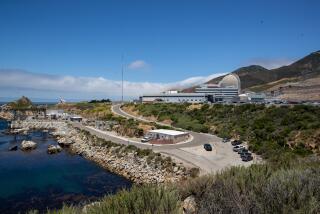NRG subsidiary to close three power plants in Southern California
In another sign of the state’s power glut, three Southern California gas-fired power plants owned by a subsidiary of energy firm NRG Energy Inc. will close over the next few months.
The NRG Etiwanda Generating Station in Rancho Cucamonga, which began operations in 1962, will be retired as of June 1. The NRG Ormond Beach Generating Station in Oxnard, which started operations in the early 1970s, will close on Oct. 1, and the NRG Ellwood Generating Station in Goleta will close on Jan. 1 after about 45 years of operations.
NRG spokesman David Knox said the three California plants are being closed for “economic reasons.”
Gladys Limon, executive director of the California Environmental Justice Alliance advocacy group, said in a statement Friday that the retirement of the three plants was “long overdue” and called for state officials to look toward “clean energy solutions.”
About 50 people employed across the plants will be affected by the decision, Knox said. Employees will be able to apply for other open positions within the company, or if not, will receive a severance package that includes outplacement services, he said.
The plants are owned by GenOn Energy Inc., which was acquired by NRG in 2012. GenOn filed for Chapter 11 bankruptcy relief in June and is expected to separate from NRG after the bankruptcy proceedings are complete, Knox said.
NRG has headquarters in Princeton, N.J., and Houston.
A Times investigation last year found that California has a large and growing glut of power.
The issue dates back to 2000, when increasing energy usage led to blackouts. State officials at the time called for the construction of new power plants to increase capacity.
At the time, there were about 700 plants throughout the state. Over the next 15 years, nearly 500 more plants opened, and California’s power supply jumped 43%.
But Californians didn’t necessarily need that much power anymore. During the recession, state residents cut back on their usage, while appliances became more efficient and rooftop solar panels became more ubiquitous. By 2015, most plants generated less than a third of their potential power.
Despite the decreased demand, California’s electricity rates increased — even as prices in the rest of the nation fell — to pay for construction of the new plants. Utility companies are guaranteed profits on new plants, regardless of how much power they sell, though government regulators say the overbuilding is part of their plan to avoid blackouts.
After the Times investigation, a California Energy Commission committee recommended in October that the state reject a proposal to build a new natural gas plant in Ventura County called the Puente Energy Project. The plant was intended to be owned by NRG, and Southern California Edison would have been under contract to supply power to the utility.
A little over a week later, the developer of the project asked state regulators to suspend review of the plans, which effectively ended the project.
Twitter: @smasunaga







